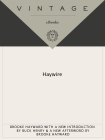Haywire by Brooke Hayward (book club books .txt) 📗

- Author: Brooke Hayward
Book online «Haywire by Brooke Hayward (book club books .txt) 📗». Author Brooke Hayward
“Brooke”—there was a shrill edge to Pamela’s voice, not quite a scream—“your father thinks it would be unseemly for a performance to go on as usual tonight. Out of respect for your mother, he decided to do what he did—”
“Kevin!” I shouted, abandoning all pretense of propriety. “Tell me—is this what happens under these circumstances in the theatre?”
There was a shudder of silence, then everyone started talking at once, and somehow Pamela maneuvered me toward the waiting car; once again I had the sense that I was flailing my way through my worst nightmare, in which the more I struggle for life against some nameless master strategy, the more I become trapped in its ruthless machinations. For many years as a child, the nightmare was recurrent and the strategy had a name: it materialized in vivid technicolor as a giant carnivorous dinosaur, a Tyrannosaurus rex, with hideous red eyes and furrows of sharp teeth that glistened hungrily in the sun. He would ring our front doorbell and settle back on his huge scaly haunches waiting for me to answer; invariably I would slip past him and, with a sudden rush of adrenalin, spread my wings and fly, soar to freedom right over his head, catch the wind and glide with it like a falcon across the desert next to our house, while just below he stalked me through the yucca and cactus, erect on his powerful rear limbs, snapping at me with salivating jaws as the wind bore me up and down and up and then, finally, down. It must have been preordained that the Honourable Pamela Digby Churchill, not yet even my stepmother, would swoop down as an emissary from my father, not only to tell me about my mother’s death in the absence of his ability to do it himself, but also to collect me efficiently for a ritual gathering of the clan, in this case my brother and sister, who were separated by half the country in mental institutions—Menninger’s, in Topeka, Kansas; Austen Riggs, in Stockbridge, Massachusetts.
I huddled in the rear of the limousine, overcome by its dizzying warmth and sensuality. Pamela covered my lap with a fur lap robe and gave me a handkerchief, which I balled up and held very tight. I thought, I must not be melodramatic, my mother’s death is a historically tragic event, it affects many other people—but all that is inconsequential—what is essential at this particular moment, what is crucial, is to be absolutely selfish. Why, if one of my parents had to die, did it have to be my mother, when I needed her so? Why not my father? Only my mother had understood me; nobody else in the world ever had or ever would in the same way, and we had really only just begun. All of my fearful battles with her for survival and identity had been fought, and just as we had learned how to shrug off ancient rivalries, to conquer our primordial fears about each other, to throw down our weapons, cease being mother and daughter, unequal or different, now that we were two individual people who had survived together, having successfully held each other and the outside world at bay for miles and years, there was something truly senseless about life if this was the result. It was a revelation. I stared out at the dark city, feeling that we were passing under it rather than through it, and thought: You might as well think whatever you want, be as self-indulgent as you need to be. You have about ten minutes of privacy, and then the sorrow of other people to deal with, Bridget and Bill, Father. Yes, I thought, of course Father loves you, but if I, Brooke, were to die tonight, it would hardly change his life at all; he would mourn, maybe shed a few tears in passing. But ah! Mother would have known the death of someone who had actually once been a part of her; there would have been a dreadful sense of mutilation of self, blood gushing out in rivers, pain almost beyond endurance. How did she die? What was the last thing she thought about?
Until now, the idea of death had been a hazy abstraction, although, as described in close detail with more or less poetry by great or even ordinary authors I’d read since childhood, or as presented in movies, it often made me cry; I had to be taken home at the age of three, hysterical, when Bambi’s mother was shot. Now I tabulated the number of times an actual death had profoundly affected me; if our dog Stewart, a pointer who’d been run over in a ghastly accident, was not counted, the tally was a meager three. Working backward, there was Herman Mankiewicz when I was fifteen and Frances Fonda when I was twelve, both close friends of my parents, and both parents of children who were close friends of mine, almost part of my own family; then there was my grandfather Colonel William Hayward, who died of cancer when I was six. The Colonel, as he was always referred to, came out from New York and stayed with us in California for a while. He knew he was dying and the idea of being an invalid confined to a wheelchair annoyed him greatly. Always an active man, he took up needlepoint, and I





Comments (0)